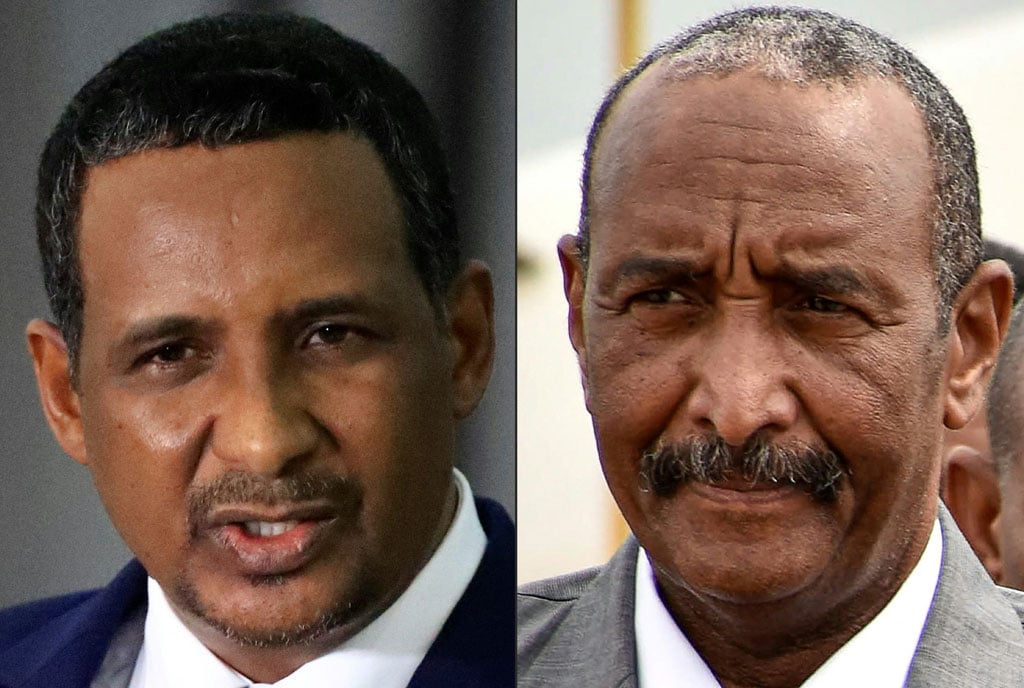Prime
Sudan factions fail to agree on ceasefire, again

This combination of pictures shows Sudan's army chief, Lieutenant-General Abdel Fattah al-Burhan (R) in Juba on October, 14, 2019; and Mohamed Hamdan Daglo (L), who commands the paramilitary Rapid Support Forces (RSF), addressing the media upon his return from Russia at Khartoum airport on March 2, 2022. PHOTO/AFP
What you need to know:
The outcome of the new round of Jeddah talks in Saudi Arabia, mediated by the Saudi Kingdom, the US and regional bloc Intergovernmental Authority on Development (Igad) means there is no guarantee that the warring sides; Sudan Armed Forces (Saf) and the Rapid Support Forces (RSF), will be reaching a peace deal soon
Sudan’s warring parties have failed to agree on an immediate ceasefire, signaling prolonged fighting even as mediators pushed for a pause and humanitarian corridors.
The outcome of the new round of Jeddah talks in Saudi Arabia, mediated by the Saudi Kingdom, the US and regional bloc Intergovernmental Authority on Development (Igad) means there is no guarantee that the warring sides; Sudan Armed Forces (Saf) and the Rapid Support Forces (RSF), will be reaching a peace deal soon.
But the co-facilitators of the talks said they had pushed parties to agree on opening humanitarian corridors and reopen direct contacts between them.
A dispatch from Igad, however, did not indicate timelines.
“The co-facilitators regret that the parties were unable to agree on ceasefire implementation arrangements during this first round. There is no acceptable military solution to this conflict,” said a statement issued by the Horn of Africa bloc, Igad which is taking part in the talks on behalf of the African Union.
Sudan’s warring parties have failed to agree on an immediate ceasefire, signaling prolonged fighting even as mediators pushed for a pause and humanitarian corridors.
The outcome of the new round of Jeddah talks in Saudi Arabia, mediated by the Saudi Kingdom, the US and regional bloc Intergovernmental Authority on Development (Igad) means there is no guarantee that the warring sides; Sudan Armed Forces (Saf) and the Rapid Support Forces (RSF), will be reaching a peace deal soon.
But the co-facilitators of the talks said they had pushed parties to agree on opening humanitarian corridors and reopen direct contacts between them.
A dispatch from Igad, however, did not indicate timelines.
“The co-facilitators regret that the parties were unable to agree on ceasefire implementation arrangements during this first round. There is no acceptable military solution to this conflict,” said a statement issued by the Horn of Africa bloc, Igad which is taking part in the talks on behalf of the African Union.
[The co-facilitators] are able to announce that the Saf and RSF have committed to take steps to facilitate increased humanitarian assistance, and to implement confidence-building measures (CBMs).”
The mediators announced the outcome as the RSF accused the Sudan Armed Forces of shelling the Al-Jili Petroleum Refinery and the sides clashed more. Since April 15 when the war broke out between two once allied forces, at least 10,000 people have been killed and more than 5 million displaced from their homes, according to various independent conflict monitors. The UN said last week the civilian suffering had worsened over the six-month period, calling for a ceasefire.
In Jeddah, the parties return to the table had been seen as initial victory, having fallen out in May when they signed the Jeddah Declaration of Commitment to Protect the Civilians but violated them.
Igad said the parties, in spite of failing on ceasefire committed to participate in a joint humanitarian forum led by the UN Office for the Coordination of Humanitarian Affairs “to resolve impediments to humanitarian access and deliveries of assistance.”
It also said that they agreed to identify points of contact to assist with movements of humanitarian personnel and assistance.
They also agreed to implement confidence-building measures by:
- Establishing communication between Saf and RSF leaders
- Arresting prison escapees and fugitives who had broken out of jail assisted by warring factions
- Improve each side’s official media discourse, and reduction of inflammatory rhetoric
- Tame actions concerning each side’s warmongers and pro-war elements



